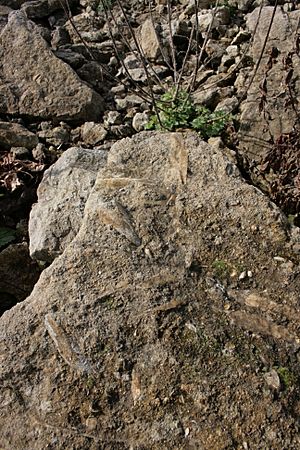Shellingford Crossroads Quarry facts for kids
| Site of Special Scientific Interest | |
 |
|
| Area of Search | Oxfordshire |
|---|---|
| Interest | Geological |
| Area | 2.6 hectares (6.4 acres) |
| Notification | 1986 |
| Location map | Magic Map |
Shellingford Crossroads Quarry is a special place in Oxfordshire, England. It covers about 2.6-hectare (6.4-acre) of land. This quarry is important because it's a Site of Special Scientific Interest (SSSI).
An SSSI is an area that is protected by law. It's chosen because it has rare wildlife, plants, or important rocks and landforms. Shellingford Crossroads Quarry is an SSSI because of its amazing geology. It's also known as a Geological Conservation Review site, which means it's one of the best places in Britain to study rocks and fossils.
Contents
A Journey Back in Time: The Jurassic Period
This quarry is like a window into Earth's past. The rocks you can see here are from a group called the Corallian Group. These rocks formed during a time called the Oxfordian stage, which was part of the Late Jurassic period.
When Dinosaurs Roamed
Imagine a world from about 160 million years ago! That's how old these rocks are. During the Late Jurassic period, dinosaurs were walking on land, and the area where Shellingford Crossroads Quarry is now was covered by a warm, shallow sea.
Amazing Fossils
One of the coolest things about Shellingford Crossroads Quarry is the many fossils you can find there. These fossils tell us a lot about the ancient sea that once covered this land.
- Corals: You can find fossils of corals. Corals are tiny sea animals that live in colonies and build reefs, much like the coral reefs we see in oceans today.
- Bivalves: There are also many fossils of bivalves. Bivalves are a type of shellfish, like clams or mussels, that have two hinged shells.
Reading the Rocks
Scientists also find this quarry important because it helps them understand stratigraphy. Stratigraphy is the study of rock layers. By looking at the different layers of rock at Shellingford Crossroads Quarry, scientists can learn how the Earth changed over millions of years during the Oxfordian stage. It helps them piece together the complex history of our planet.

